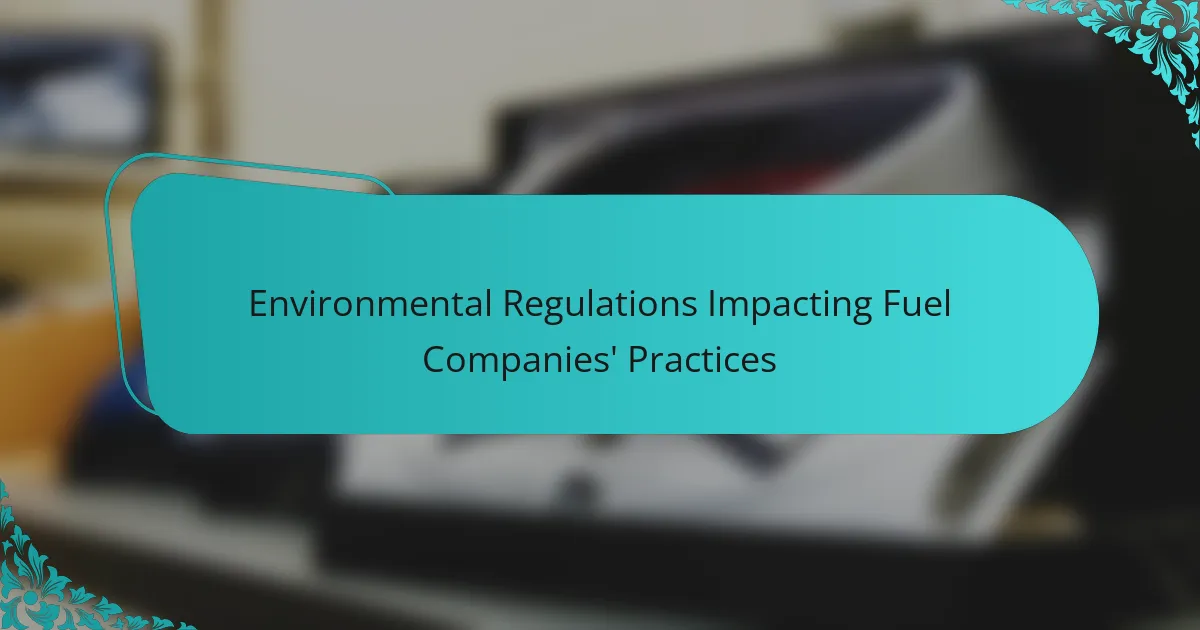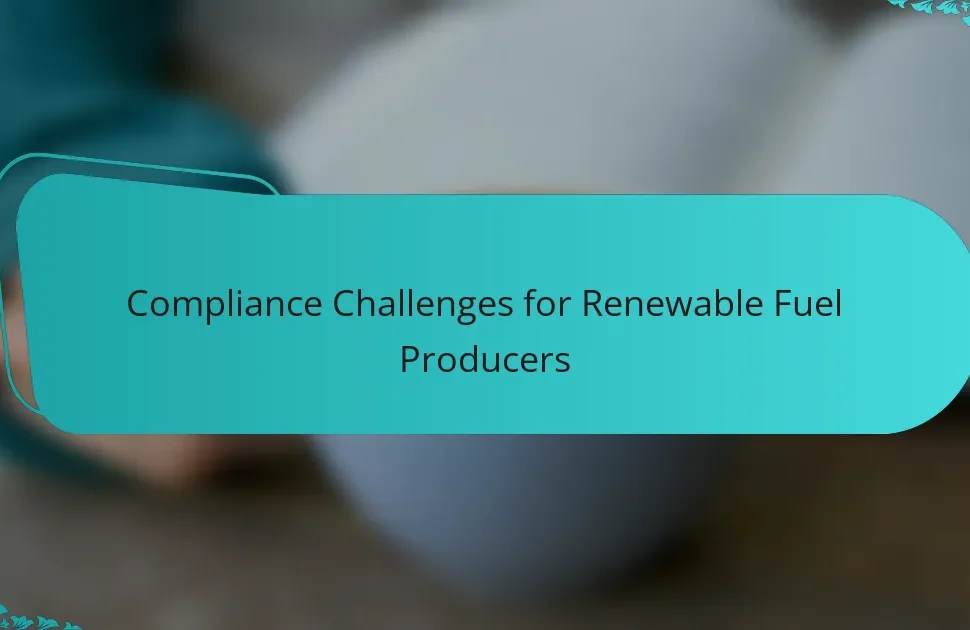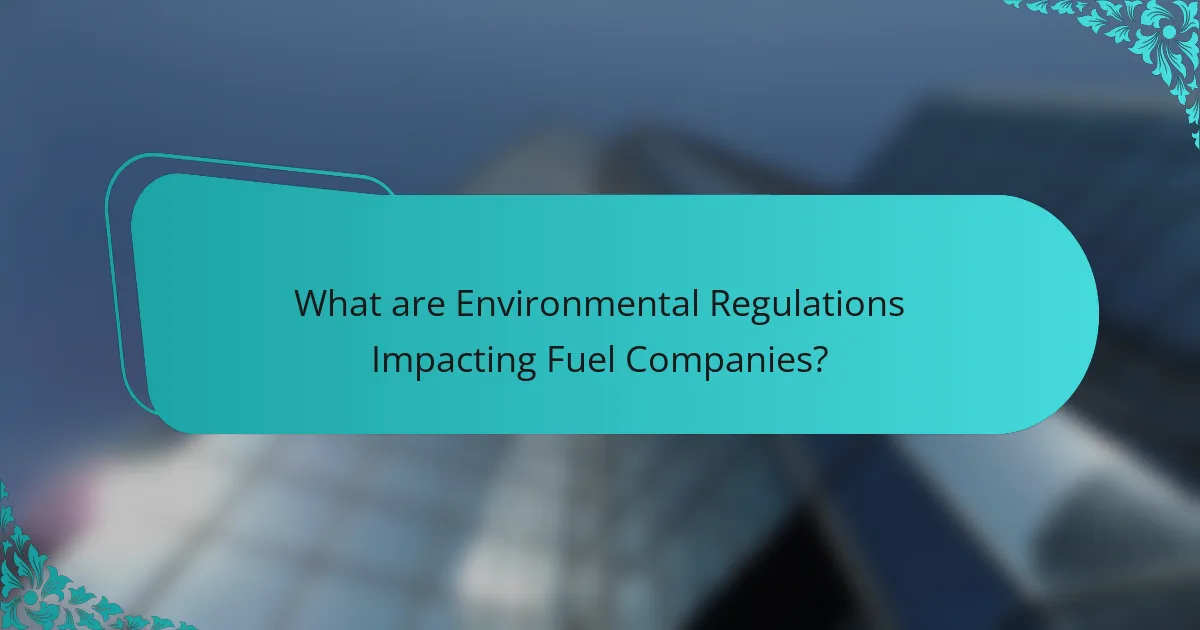
What are Environmental Regulations Impacting Fuel Companies?
Environmental regulations impacting fuel companies include laws and policies aimed at reducing pollution and promoting sustainability. These regulations often require companies to limit emissions of greenhouse gases and other pollutants. For example, the Clean Air Act in the United States sets standards for air quality and emissions. The Clean Water Act regulates discharges into water bodies, affecting how fuel companies manage wastewater. Additionally, the National Environmental Policy Act mandates environmental assessments for major projects. Compliance with these regulations often involves significant financial investment for fuel companies. Non-compliance can lead to fines and legal repercussions. Overall, these regulations shape operational practices and influence the industry’s environmental impact.
How do these regulations influence fuel company operations?
Regulations significantly influence fuel company operations by imposing compliance requirements. These regulations often dictate emission standards that companies must meet. Fuel companies may invest in cleaner technologies to adhere to these standards. This investment can lead to increased operational costs in the short term. Additionally, regulations can impact supply chain decisions, encouraging companies to source more sustainable fuels. Failure to comply with regulations can result in substantial fines and legal repercussions. Moreover, regulations can shape public perception, affecting brand reputation and customer loyalty. In summary, these regulations drive operational changes that can enhance sustainability but may also increase costs and risk.
What specific practices are affected by environmental regulations?
Environmental regulations affect various practices in fuel companies. These include emissions control practices, waste management procedures, and resource extraction methods. Companies must implement technologies to reduce greenhouse gas emissions. Regulations also mandate the proper disposal of hazardous waste generated during fuel production. Additionally, extraction practices must comply with environmental impact assessments. This ensures that natural habitats are preserved and pollution is minimized. Compliance with these regulations can lead to significant operational changes. Fuel companies often face fines for non-compliance, underscoring the importance of adhering to these regulations.
How do fuel companies adapt to comply with these regulations?
Fuel companies adapt to comply with environmental regulations by implementing new technologies and practices. They invest in cleaner fuel alternatives to meet emissions standards. Many companies adopt advanced refining techniques to reduce pollutants. They also enhance monitoring systems for emissions to ensure compliance. Training programs for employees on regulatory requirements are common. Companies often engage in sustainability initiatives to improve their public image. Regular audits help assess compliance with regulations. Collaboration with regulatory bodies also aids in understanding and adhering to new laws.
Why are environmental regulations necessary for fuel companies?
Environmental regulations are necessary for fuel companies to minimize environmental harm. These regulations help control emissions that contribute to air and water pollution. They ensure that fuel companies adopt sustainable practices. Compliance with regulations reduces the risk of environmental disasters. Regulations also protect public health by limiting harmful pollutants. Historical data shows that stricter regulations lead to improved air quality. For example, the Clean Air Act has significantly reduced sulfur dioxide emissions since its implementation. Overall, these regulations are essential for safeguarding ecosystems and public well-being.
What environmental issues do these regulations address?
These regulations address air pollution, water contamination, and waste management. Air pollution regulations aim to reduce emissions of harmful pollutants from fuel production and distribution. Water contamination regulations focus on preventing spills and leaks that can harm water sources. Waste management regulations ensure proper disposal and treatment of hazardous materials generated by fuel companies. Together, these regulations help protect ecosystems and public health from the adverse effects of fuel industry practices.
How do these regulations contribute to sustainability in the fuel industry?
Regulations contribute to sustainability in the fuel industry by enforcing standards that reduce environmental impact. These standards limit greenhouse gas emissions from fuel production and usage. Regulations also promote the use of cleaner technologies and renewable energy sources. For instance, the Renewable Fuel Standard mandates a certain volume of renewable fuel to be blended into the fuel supply. This encourages innovation and investment in sustainable practices. Additionally, regulations often require companies to report their environmental performance, increasing transparency. This accountability drives companies to adopt more sustainable practices. Studies indicate that compliance with such regulations leads to significant reductions in pollutants. For example, the U.S. Environmental Protection Agency reported a 70% decrease in sulfur dioxide emissions due to regulatory measures.
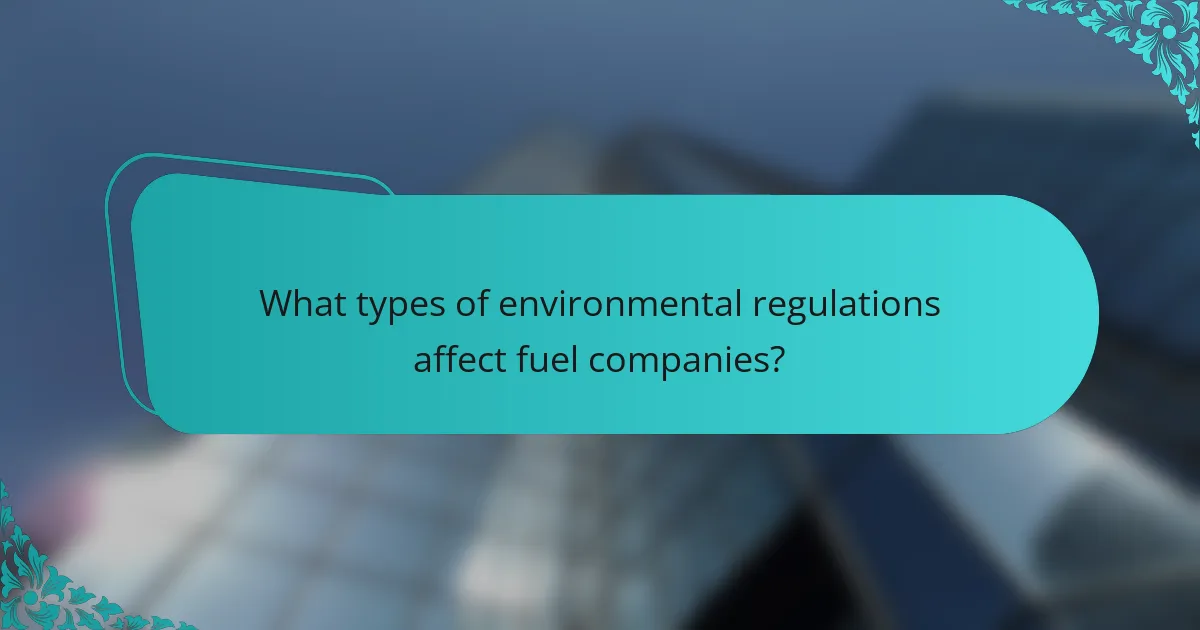
What types of environmental regulations affect fuel companies?
Fuel companies are affected by various types of environmental regulations. These regulations include emissions standards, which limit the amount of pollutants released into the air. They also encompass fuel quality standards, ensuring that fuels meet specific environmental criteria. Additionally, companies must comply with spill prevention and response regulations, which dictate how to manage potential fuel leaks or spills. There are also regulations regarding land use and habitat protection, which affect where fuel extraction and processing can occur. Moreover, reporting and monitoring requirements mandate that companies disclose their environmental impact. These regulations are enforced by agencies such as the Environmental Protection Agency (EPA) in the United States. Compliance with these regulations is crucial for fuel companies to operate legally and sustainably.
How do federal regulations differ from state regulations?
Federal regulations are established by national authorities, while state regulations are set by individual state governments. Federal regulations apply uniformly across all states, ensuring national consistency. In contrast, state regulations can vary significantly from one state to another. This allows states to address local environmental concerns and conditions. For example, the Clean Air Act sets federal air quality standards, but states can implement stricter measures. Additionally, federal regulations often preempt state laws when there is a conflict. This means that if a state regulation contradicts federal law, the federal law takes precedence. The differences can impact how fuel companies operate, as they must comply with both sets of regulations.
What are the key federal regulations impacting fuel companies?
Key federal regulations impacting fuel companies include the Clean Air Act, the Clean Water Act, and the Resource Conservation and Recovery Act. The Clean Air Act regulates air emissions from stationary and mobile sources. It sets National Ambient Air Quality Standards to protect public health and the environment. The Clean Water Act governs discharges of pollutants into U.S. waters. It establishes the National Pollutant Discharge Elimination System for permitting. The Resource Conservation and Recovery Act manages hazardous waste from its creation to disposal. It ensures safe handling and storage of waste products from fuel production. These regulations collectively shape operational practices within the fuel industry.
Which state regulations are particularly influential?
California’s Cap-and-Trade Program is particularly influential among state regulations. This program sets a limit on greenhouse gas emissions from fuel companies. It requires companies to buy permits for their emissions. The revenue generated funds renewable energy projects. Other states often look to California’s model for inspiration. The program has significantly reduced emissions since its inception in 2013. Additionally, New York’s Climate Leadership and Community Protection Act mandates a transition to renewable energy. This act influences fuel companies by setting ambitious emissions reduction goals. These regulations shape industry practices across the nation.
What are the international regulations that fuel companies must consider?
Fuel companies must consider several international regulations. Key regulations include the International Maritime Organization (IMO) regulations on sulfur emissions. The IMO’s MARPOL Annex VI limits sulfur content in marine fuels to 0.5% since 2020. The Paris Agreement also impacts fuel companies by setting targets for greenhouse gas emissions reduction. Companies must comply with the European Union Emissions Trading System (EU ETS), which caps emissions from power plants and industrial sectors. Additionally, the United Nations Framework Convention on Climate Change (UNFCCC) outlines climate change mitigation strategies. Compliance with these regulations is essential for global operations and sustainability efforts.
How do global environmental agreements impact local fuel practices?
Global environmental agreements influence local fuel practices by setting binding targets for emissions reductions. These agreements, such as the Paris Agreement, encourage countries to adopt cleaner fuels and technologies. Local governments often implement policies that align with international commitments. This can include subsidies for renewable energy sources and penalties for high-emission fuels. As a result, fuel companies may shift towards more sustainable practices to comply with regulations. For instance, countries that ratify such agreements often see an increase in investments in biofuels and electric vehicle infrastructure. Data shows that nations adhering to these agreements experience a measurable decrease in greenhouse gas emissions from the fuel sector. This demonstrates a direct correlation between global commitments and local fuel practices.
What role do international organizations play in regulating fuel companies?
International organizations play a crucial role in regulating fuel companies. They establish guidelines and standards to ensure environmental protection. Organizations like the United Nations and the International Energy Agency influence policies on emissions and sustainability. These entities facilitate international agreements, such as the Paris Agreement, which aims to limit global warming. They also provide technical assistance and resources to countries for implementing regulations. Additionally, international organizations monitor compliance and report on progress towards environmental goals. Their efforts promote accountability and drive the adoption of cleaner technologies in the fuel industry.
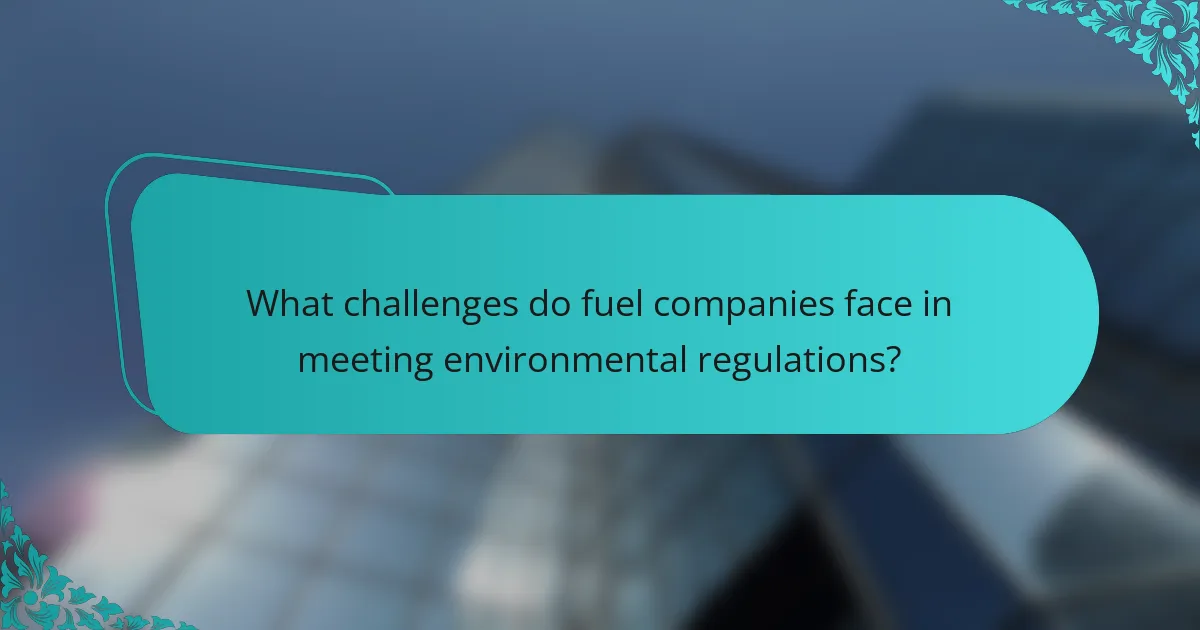
What challenges do fuel companies face in meeting environmental regulations?
Fuel companies face significant challenges in meeting environmental regulations. Compliance requires substantial financial investment for technology upgrades. Many regulations mandate reductions in greenhouse gas emissions. This necessitates the adoption of cleaner fuel alternatives. Additionally, companies must navigate complex regulatory frameworks. Varying regulations across regions complicate compliance efforts. There is also pressure from stakeholders for greater transparency. Non-compliance can lead to hefty fines and reputational damage. Overall, balancing profitability with regulatory adherence remains a key challenge.
How do compliance costs affect fuel company operations?
Compliance costs significantly impact fuel company operations by increasing overall expenses. These costs arise from adhering to environmental regulations and standards. Fuel companies must invest in technology to reduce emissions and meet safety requirements. This often leads to higher operational costs. Companies may also face penalties for non-compliance, adding financial pressure. Additionally, compliance costs can affect pricing strategies. Higher costs may be passed on to consumers, influencing market competitiveness. According to a 2020 report by the American Petroleum Institute, compliance costs can account for up to 30% of a fuel company’s total operating budget. This financial burden can limit investment in innovation and expansion.
What are the financial implications of non-compliance?
Non-compliance with environmental regulations can lead to significant financial implications for fuel companies. These implications include hefty fines imposed by regulatory bodies. For example, the Environmental Protection Agency (EPA) can levy fines reaching millions of dollars for violations. Additionally, non-compliance can result in costly legal battles. Legal fees and settlements can further strain financial resources.
Moreover, companies may face increased operational costs due to the need for retrofitting facilities to meet compliance standards. This can involve substantial capital investment. Non-compliance can also damage a company’s reputation, leading to loss of business and decreased market share. A tarnished reputation can deter potential investors and partners.
In summary, the financial implications of non-compliance are multifaceted, encompassing fines, legal costs, operational expenses, and reputational damage. These factors can significantly affect a fuel company’s bottom line.
How do fuel companies manage the risk of regulatory changes?
Fuel companies manage the risk of regulatory changes through proactive compliance strategies. They invest in legal and regulatory expertise to interpret and anticipate changes. These companies often engage in lobbying efforts to influence policy decisions. They also diversify their energy portfolios to adapt to shifting regulations. Risk assessment frameworks are employed to evaluate potential impacts of new laws. Additionally, fuel companies conduct regular audits to ensure compliance with existing regulations. Collaboration with industry associations helps them stay informed on regulatory trends. This multifaceted approach enables them to mitigate risks associated with regulatory changes effectively.
What technological advancements are helping fuel companies comply?
Technological advancements aiding fuel companies in compliance include advanced monitoring systems and data analytics. These systems allow real-time tracking of emissions and operational efficiency. Automated reporting tools streamline compliance documentation, reducing human error. Blockchain technology enhances transparency in fuel sourcing and distribution. Artificial intelligence optimizes fuel processing and reduces waste. Remote sensing technologies improve leak detection and environmental monitoring. Regulatory compliance software assists in staying updated with changing regulations. These advancements collectively enhance compliance efforts and operational sustainability.
How do innovations in fuel technology support regulatory compliance?
Innovations in fuel technology enhance regulatory compliance by improving emissions control and efficiency. Advanced fuel formulations reduce harmful pollutants released during combustion. Technologies such as cleaner-burning fuels and biofuels meet stringent environmental standards. Innovations like carbon capture and storage further minimize greenhouse gas emissions. For instance, the U.S. Environmental Protection Agency sets limits on sulfur content in fuels. New refining processes allow companies to produce low-sulfur fuels that comply with these regulations. Additionally, real-time monitoring systems help fuel companies track emissions accurately. This proactive approach ensures adherence to evolving regulations. Ultimately, these innovations facilitate compliance while promoting sustainability in the fuel industry.
What role does data management play in achieving compliance?
Data management plays a crucial role in achieving compliance with environmental regulations. It ensures accurate tracking of data related to emissions, waste disposal, and resource usage. Effective data management allows fuel companies to maintain records that demonstrate adherence to regulatory requirements. This includes monitoring fuel production processes and environmental impact assessments. Regulatory bodies often require specific data submissions, making robust data management essential. Companies that implement comprehensive data management systems can quickly produce necessary documentation during audits. Furthermore, data management helps identify areas for improvement and risk mitigation. By streamlining data collection and analysis, companies can enhance their compliance strategies.
What best practices can fuel companies adopt to navigate environmental regulations?
Fuel companies can adopt several best practices to navigate environmental regulations effectively. First, they should implement comprehensive compliance management systems. These systems help track regulatory changes and ensure adherence to local, state, and federal laws. Regular training for employees on environmental compliance is crucial. This training enhances awareness of regulations and promotes a culture of sustainability.
Conducting environmental audits is another best practice. Audits identify areas for improvement and ensure that operations align with regulatory standards. Engaging with stakeholders, including regulatory bodies and local communities, fosters transparency and collaboration. This engagement can lead to better compliance and community support.
Investing in cleaner technologies is essential for long-term sustainability. Technologies such as carbon capture and renewable energy sources reduce environmental impact. Additionally, fuel companies should develop and implement sustainability reports. These reports demonstrate commitment to environmental stewardship and regulatory compliance.
Finally, establishing a dedicated environmental compliance team can streamline efforts to meet regulations. This team can focus on monitoring, reporting, and improving practices continuously. These best practices collectively enhance a fuel company’s ability to navigate complex environmental regulations effectively.
How can fuel companies engage stakeholders in compliance efforts?
Fuel companies can engage stakeholders in compliance efforts by implementing transparent communication strategies. Regular updates about regulatory changes and compliance measures foster trust. Hosting stakeholder meetings allows for direct feedback and collaboration. Establishing partnerships with local communities enhances shared understanding of environmental impacts. Providing training sessions for employees ensures everyone is informed about compliance responsibilities. Utilizing digital platforms for information sharing increases accessibility and engagement. Conducting surveys can gauge stakeholder concerns and expectations. These methods create a collaborative environment that supports compliance with environmental regulations.
What strategies can enhance transparency and accountability in regulatory practices?
Implementing clear communication strategies enhances transparency and accountability in regulatory practices. Establishing open channels for stakeholder engagement allows for diverse input. Regular public reporting on regulatory outcomes fosters trust. Utilizing technology for real-time data sharing increases accessibility. Conducting independent audits ensures compliance and identifies areas for improvement. Training regulators on ethical standards promotes integrity. Encouraging whistleblower protections empowers individuals to report misconduct. These strategies collectively improve regulatory effectiveness and public confidence.
Environmental regulations impacting fuel companies include laws and policies designed to reduce pollution and promote sustainability, such as the Clean Air Act and Clean Water Act. These regulations influence operational practices by imposing compliance requirements that drive investments in cleaner technologies and sustainable fuels. The article examines specific practices affected by these regulations, the necessity of compliance, and the financial implications of non-compliance. It also discusses how fuel companies adapt to regulatory changes, the role of technological advancements, and best practices for navigating these complex environmental frameworks. Additionally, it highlights the importance of stakeholder engagement and transparency in regulatory practices.
